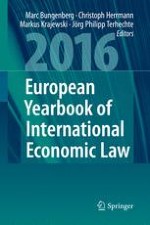Volume 7 of the EYIEL focusses on critical perspectives of international economic law. Recent protests against free trade agreements such as the Transatlantic Trade and Investment Partnership (TTIP) remind us that international economic law has always been a politically and legally contested field. This volume collects critical contributions on trade, investment, financial and other subfields of international economic law from scholars who have shaped this debate for many years. The critical contributions to this volume are challenged and sometimes rejected by commentators who have been invited to be “critical with the critics”. The result is a unique collection of critical essays accompanied by alternative and competing views on some of the most fundamental topics of international economic law.
In its section on regional developments, EYIEL 7 addresses recent megaregional and plurilateral trade and investment agreements and negotiations. Short insights on various aspects of the Transpacific Partnership (TPP) and its sister TTIP are complemented with comments on other developments, including the African Tripartite FTA und the negotiations on a plurilateral Trade in Services Agreement (TiSA). Further sections address recent WTO and investment case law as well as recent developments concerning the IMF, UNCTAD and the WCO. The volume closes with reviews of recent books in international economic law.
